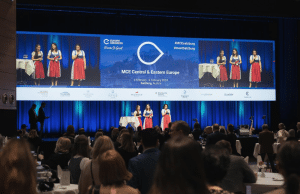The success of a meeting depends also on the volume of conference delegates who in turn make the economic, social and environmental impact on the destination. So as to increase the attendance level and in turn assure the successful and lucrative running of the meeting, it is of key importance to understand what motivates an individual to attend a meeting. In particular what drives an individual to participate in an association meeting?
The association meetings attendees have the “freedom of choice” whether to attend the conference or not. And the association market is a very competitive market due to the increasing number of associations vying for members and attendees, reduced or tightened expense funding for travel by many organizations and the dependence of associations on profits from conventions.
The participation decision-making process in association market is very similar to the general tourism destination selection process. Several “push” and “pull” factors are involved as well as barriers and intervening opportunities. This means that behaviour of association meetings attendees is significantly similar to the behaviour of leisure tourists deciding to go on holiday.
The travel patterns and buying behaviour of participants of association meetings are potentially influenced by their perception of the destination, conference organizers, their own needs and desires as well as financial and other factors.
The following table presents motivating factors from the perspective of the potential attendees as examined by Price (1993), Opperman and Chon (1997), Rittichainuwat, Beck and Lalopa (2001) as well as Zhang, Leung and Qu (2007).
Author | Attendee motivation factors |
Opperman and Chon (1997) | • Personal/business factors • Association/conference factors • Location factors • Intervening opportunities |
Price & Murrmann (2000) | • Profession-based values (education) • Competency-based values (education) • People-based values (networking) • Association-based values (involvement) · Civic-based values (leadership) |
Rittichainuwat, Beck and Lalopa (2001) | • Education (conference programs) • Networking • Career enhancement • Travelling to desirable place • Leadership enhancement • Association related activities • Business activities • Self-esteem enhancement • Sightseeing |
Zhang, Leung and Qu (2007) | · Association/conference factors · Personal/business factors · Location factors · Total cost factors |
In sum, education, networking and professional leadership are the three most important motivators influencing association members’ meeting participation decision.
In November 2008, a research was carried out to examine main decision variables for attending a meeting in the Slovenian capital, Ljubljana. The underlying dimensions of the association conference delegate decision-making process were found to be the possibility of networking and of professional education and training. Hence the top scoring motivators for attending a conference in Ljubljana are related to the association/conference factors. The third most important factor was security, followed by various location factors.
Since the attendees have a large selection of meetings, conventions and trade shows to choose from, it is more important than ever to have a better understanding of the decision-making process of conference attendees. Their attendance is in turn a major factor in the economic fortunes of the convention destinations.













